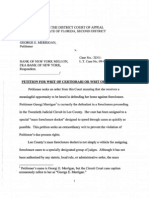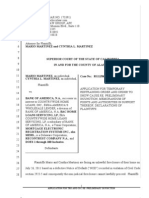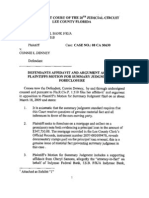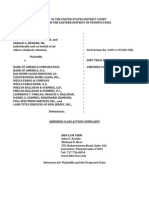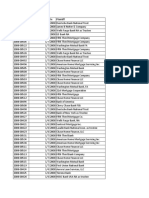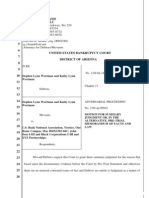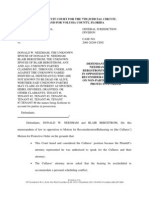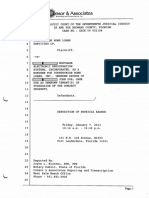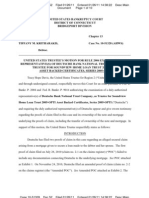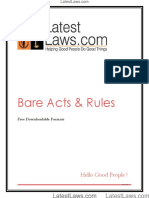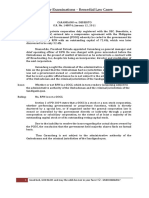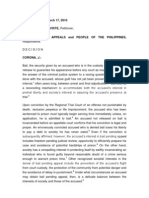Foreclosure Case Law Summaries
Foreclosure Case Law Summaries
Uploaded by
burtman3310Copyright:
Available Formats
Foreclosure Case Law Summaries
Foreclosure Case Law Summaries
Uploaded by
burtman3310Copyright
Available Formats
Share this document
Did you find this document useful?
Is this content inappropriate?
Copyright:
Available Formats
Foreclosure Case Law Summaries
Foreclosure Case Law Summaries
Uploaded by
burtman3310Copyright:
Available Formats
FORECLOSURE LAW SUMMARIES
There must be an allegation in Plaintiffs Complaint that the mortgagee, Plaintiff in the foreclosure action, is the present owner/holder of the mortgage and note Edason v. Central Farmers Trust Co., 129 So. 698 (Fla. 1930) Copies of the Note and Mortgage must be attached to the Complaint Eigen v. Federal Deposit Ins. Corp., 492 So. 2d 826 (2d DCA 1986)
After February 11, 2010, Verification of Complaint by Plaintiff Florida Rule of Civil Procedure 1.110(b)
An Attorney in Fact may not make any affidavit as to the personal knowledge of the principal Florida Statute 709.2201(3)(b) Re-Establishment of Note Florida Statute 673.3091 Re-Establishment of Mortgage Florida Statute 71.011 Mortgage, as an operation of law, follows the transfer of the debt (Note) unless there be some plain and clear agreement to the contrary, if that be the intention of the parties Johns v. Gillian, 184 So. 140, 143 (Fla. S. Ct. 1938) In order for an Assignment of Mortgage to be valid, must be signed by a corporate officer and must have the common or corporate seal affixed to it Florida Statute 692.01 Assignment of Mortgage must be dated to be effective before the filing of the Complaint Jeff-Ray Corp. v. Jacobson, 566 So. 2d 885 (Fla 4th DCA 1990) If the Note does not name the Plaintiff as the payee, the note must bear a special indorsement in favor of the Plaintiff or a blank indorsement Riggs v. Aurora Loan Servs., LLC, 36 So.3d 932, 933 (Fla. 4th DCA 2010) Plaintiff must provide Note at least 20 days before hearing Florida Rule of Civil Procedure 1.510
Summary Judgment evidence Insufficient Glarum v. LaSalle Bank, 2011 W.L. 390 3161 When a Plaintiff moves for summary judgment before the defendant has filed an answer, the burden is upon the Plaintiff to make it appear to a certainty that no answer which the Defendant might properly serve could present a genuine issue of fact Settecasi v. Board of Public Instruction of Pinellas County, Fla. 2d DCA 1963) Plaintiff, who had filed motion for summary judgment before defendant filed an answer, was not entitled to summary judgment on basis that defendant had failed to file affidavits establishing genuine issues of material fact, where defendant noted issues of material fact that could be raised in an answer to the complaint Howell v. Ed Bebb, 35 So. 3d 167 (2010) In order to pursue a foreclosure action, the party seeking foreclosure must present evidence that it owns and holds the note and mortgage in question in order to proceed with a foreclosure action. A plaintiff must tender the original promissory note to the trial court or seek to reestablish the lost note under Sect 673.3091. Moreover, if the note does not name the Plaintiff as the payee, the note must bear a special indorsement in favor of the Plaintiff or a blank indorsement. Alternatively, the Plaintiff may submit evidence of an assignment from the payee to the Plaintiff or an affidavit of ownership to prove its status as a holder of the note Servedio v. US Bank National Associaton, 46 So.3d 1105 (Fla. 4th DCA 2010) Any paper filed on the record will defeat a Lack of Prosecution motion Wilson v. Salamon, 923 So. 363 (S. Ct. Fl. 2005) In order to pursue a foreclosure action, the party seeking foreclosure must present evidence that it owns and holds the note and mortgage in question in order to proceed with a foreclosure action. A plaintiff must tender the original promissory note to the trial court or seek to reestablish the lost note under Sect 673.3091. Moreover, if the note does not name the Plaintiff as the payee, the note must bear a special indorsement in favor of the Plaintiff or a blank indorsement. Alternatively, the Plaintiff may submit evidence of an assignment from the payee to the Plaintiff or an affidavit of ownership to prove its status as a holder of the noteIn a mortgage foreclosure action, trial court could not enter summary judgment on banks claims seeking to reestablish lost note and mortgage and to reform legal description contained in mortgage and deed, since bank failed to mention those claims in its summary judgment motion Gee v. US Bank National Association, 2011 WL 4645602 (5th DCA Orlando) A trial courts refusal to permit an amendment of a pleading is an abuse of discretion unless it is clear that: (1) the amendment would prejudice the opposing party; (2) the privilege to amend has been abused; or (3) the amendment would be futile; Courts should be especially liberal in granting leave to
amend a pleading when leave to amend is sought at or before a hearing on a motion for summary judgment Laurencio v. Deutsche Bank National Trust Company, 65 So. 3d 1190 (2011) Rule on relation back of amended pleadings did not permit health-care provider to establish the right to maintain an action against automobile insurer retroactively by acquiring standing to file lawsuit after the fact, and, thus, the rule did not cure providers lack of standing when it filed suit before insured had assigned personal injury protection benefits to the provider; the provider needed to file new lawsuit after receiving the assignment Progressive Express Insurance Company v. McGrath Community Chiropractic, 913 So. 2d 1281 (2005) An allonge is a piece of paper annexed to a negotiable instrument or promissory note, on which to write endorsements for which there is no room on the instrument itself Booker v. Sarasota, Inc., 707 So. 2d 886, 887 (Fla. 1st DCA 1998) Persons entitled to enforce a negotiable instrument: The term person entitled to enforce an instrument means: (1) The holder of the instrument (2) A nonholder in possession of the instrument who has the rights of a holder; or (3) A person not in possession of the instrument who is entitled to enforce the instrument pursuant to 673.3091 or 673.4181(4) Florida Statute 673.3011 The proper party with standing to foreclose a note and/or mortgage is the holder of the note and mortgage or the holders representative Mortgage Elec. Registration Sys., Inc. v. Azize, 965 So.2d 151, 153 (Fla. 2d DCA 2007); Troupe v. Redner, 652 So. 2d 394, 395-96 (Fla. 2d DCA 1995); Philogene v. ABN Amro Mortgage Group, Inc., 948 So.2d 45, 46 (Fla. 4th DCA 2006) When exhibits are attached to a complaint, the content of the exhibits control over the allegations of the complaint Hunt Ridge at Tall Pines, Inc. v. Hall, 766 So.2d 399, 401 (Fla. 2d DCA 2000) Genuine issues of material fact exist as to whether mortgagor was provided with a notice of acceleration, as required by the mortgage Sandoro v. HSBC Bank, USA National Association, 55 So. 3d 730 (2011) Triable issues existed as to whether mortgagor was provided with a notice of acceleration Frost v. Regions Bank, 15 So. 3d 905 (4th DCA 2009) Wroblewski v.
Morrisson v. U.S. Bank It is well established that during a summary judgment, when a Defendant has asserted Affirmative Defenses, the Plaintiff must either disprove those affirmative defenses by competent evidence or establish their legal insufficiency Pavolini v. Williams, 915 So. 2d 251, 253 (Fla. 5th DCA 2005) Deluxe Pursuant to Fla. R. of Civ. P. 1.190(a), appellants were required to respond to the amended complaint within 20 days of service of that pleading, and they did so in a timely fashion. Since the Plaintiff had filed an amended complaint and the time for responding to the amended complaint had not expired, entry of the default was improper because the amended complaint superseded the original complaint Isle of Sandalfoot v. Jess Leisch- General Contractors, Inc., 426 So. 2d 1223 (Fla. 4th DCA 1983)
You might also like
- Anti-SLAPP Law Modernized: The Uniform Public Expression Protection ActFrom EverandAnti-SLAPP Law Modernized: The Uniform Public Expression Protection ActNo ratings yet
- J Woodbridge 1 4PP BANA Corp Rep para 22Document100 pagesJ Woodbridge 1 4PP BANA Corp Rep para 22DinSFLA100% (2)
- Washington Mutual Bank Closing BookDocument112 pagesWashington Mutual Bank Closing BookJeanni Schipper100% (2)
- 6 Case File Montana Paatalo v. J.P. Morgan Chase Motion To Re-Open Discovery Re Inspection of 118 Page Wamu PAADocument5 pages6 Case File Montana Paatalo v. J.P. Morgan Chase Motion To Re-Open Discovery Re Inspection of 118 Page Wamu PAADeontos100% (1)
- Lender Processing Services (Formerly FIS) Newsletter The Summit September 2006Document20 pagesLender Processing Services (Formerly FIS) Newsletter The Summit September 2006lizinsarasotaNo ratings yet
- Quantum of Justice - The Fraud of Foreclosure and the Illegal Securitization of Notes by Wall Street: The Fraud of Foreclosure and the Illegal Securitization of Notes by Wall StreetFrom EverandQuantum of Justice - The Fraud of Foreclosure and the Illegal Securitization of Notes by Wall Street: The Fraud of Foreclosure and the Illegal Securitization of Notes by Wall StreetNo ratings yet
- Bond Rights22Document3 pagesBond Rights22Ghetto Vader100% (10)
- Petition for Extraordinary Writ Denied Without Opinion– Patent Case 94-1257From EverandPetition for Extraordinary Writ Denied Without Opinion– Patent Case 94-1257No ratings yet
- LYNN E. SZYMONIAK - Trust Assignment Fraud Letter To SEC - 2Document6 pagesLYNN E. SZYMONIAK - Trust Assignment Fraud Letter To SEC - 2fox23434No ratings yet
- Harvin's Initial BriefDocument33 pagesHarvin's Initial BriefAl HarvinNo ratings yet
- EasyKnock v. Feldman and Feldman - Memorandum and OrderDocument12 pagesEasyKnock v. Feldman and Feldman - Memorandum and OrderrichdebtNo ratings yet
- IndyMac OneWest Why They Do Not Do Loan ModificationsDocument9 pagesIndyMac OneWest Why They Do Not Do Loan Modificationstraderash1020No ratings yet
- 8 The Silver Lining in Paatalo v. JPMorgan Chase Bank NA Et AlDocument3 pages8 The Silver Lining in Paatalo v. JPMorgan Chase Bank NA Et AlDeontosNo ratings yet
- Appel Opening Brief Final Gates 7-2-2012 ConformedDocument32 pagesAppel Opening Brief Final Gates 7-2-2012 ConformedNancy Duffy McCarronNo ratings yet
- Not A Certified Copy: Filing# 61018964 E-Filed 08/28/2017 03:37:24 PMDocument113 pagesNot A Certified Copy: Filing# 61018964 E-Filed 08/28/2017 03:37:24 PMlschneider68No ratings yet
- Angela Sacchi V Mers June 24 2011 - HOMEOWNER SURVIVES MOTION TO DISMISS FAC IN CALIFORNIA-THIS JUDGE GETS ITDocument18 pagesAngela Sacchi V Mers June 24 2011 - HOMEOWNER SURVIVES MOTION TO DISMISS FAC IN CALIFORNIA-THIS JUDGE GETS IT83jjmackNo ratings yet
- In The United States District Court For The District of Colorado Judge Raymond P. MooreDocument12 pagesIn The United States District Court For The District of Colorado Judge Raymond P. MooreEquality Case FilesNo ratings yet
- BONY Quiet Title MotionDocument14 pagesBONY Quiet Title MotionHarry Davidoff100% (1)
- Chase Had No Effective Control Over Its Foreclosure Processes - Oig Hud Audit Report On Chase - March 12 2012 - Notaries Did Illegal NotarizationsDocument16 pagesChase Had No Effective Control Over Its Foreclosure Processes - Oig Hud Audit Report On Chase - March 12 2012 - Notaries Did Illegal Notarizations83jjmack100% (1)
- Merrigan v. Bank of New York - Petition Challenging Constitutionality of Lee County, FL Foreclosure CourtDocument52 pagesMerrigan v. Bank of New York - Petition Challenging Constitutionality of Lee County, FL Foreclosure CourtForeclosure FraudNo ratings yet
- Martinez TRO AppDocument7 pagesMartinez TRO AppELA_nickNo ratings yet
- FINALLY!!! Supreme Court of Florida DENIES Ben-Ezra and Katz, P.A.'s Motion For Rehearing and Shapiro and Fishman, LLP's Motion For RehearingDocument2 pagesFINALLY!!! Supreme Court of Florida DENIES Ben-Ezra and Katz, P.A.'s Motion For Rehearing and Shapiro and Fishman, LLP's Motion For RehearingForeclosure FraudNo ratings yet
- Letter To The State of Florida Re. Notary Fraud 03.11.2011Document64 pagesLetter To The State of Florida Re. Notary Fraud 03.11.2011lschneider68No ratings yet
- Def Aff and Argument Against Plain MSJDocument60 pagesDef Aff and Argument Against Plain MSJMackLawfirm100% (1)
- 4 DCA - Acosta v. Deusche Bank - Rule 1.540 (B)Document3 pages4 DCA - Acosta v. Deusche Bank - Rule 1.540 (B)winstons2311No ratings yet
- EVALUATE THE ASSIGNMENTS SAYS THE SUPREME COURT - Carl Piazza v. Citimortgage - Supreme Court "Mediation, Directs Dist. Ct. To Evaluate AssignmentsDocument4 pagesEVALUATE THE ASSIGNMENTS SAYS THE SUPREME COURT - Carl Piazza v. Citimortgage - Supreme Court "Mediation, Directs Dist. Ct. To Evaluate Assignments83jjmackNo ratings yet
- 2018-06-22 Rickey M. Gilliam v. Ba PDFDocument52 pages2018-06-22 Rickey M. Gilliam v. Ba PDFdbush1034No ratings yet
- New Century Liquidating Trust Files Emergency Motion Re Plan InjunctionDocument21 pagesNew Century Liquidating Trust Files Emergency Motion Re Plan Injunction83jjmackNo ratings yet
- Mathew (241-14) - 2017 - Mot 001 - 20180413 SOL DismissalDocument6 pagesMathew (241-14) - 2017 - Mot 001 - 20180413 SOL DismissalDinSFLA100% (1)
- U.S. Bank v. Ibanez #1Document21 pagesU.S. Bank v. Ibanez #1richdebtNo ratings yet
- Motion For CR 11 Sanctions Against PlaintiffsDocument15 pagesMotion For CR 11 Sanctions Against PlaintiffsKaren PooleyNo ratings yet
- BOA Complaint 8.19.11 FinalDocument128 pagesBOA Complaint 8.19.11 FinalMaddie O'DoulNo ratings yet
- Injunction Granted Against JP Morgan Chase For WAMU HELOC in Case Alleging Predatory Lending PracticesDocument3 pagesInjunction Granted Against JP Morgan Chase For WAMU HELOC in Case Alleging Predatory Lending PracticesKenneth G. EadeNo ratings yet
- Fivecoat Foreclosures & FraudDocument429 pagesFivecoat Foreclosures & FraudAlbertelli_Law100% (1)
- USDC WPB CFPB V OCWEN 17mar21 Motion To ReopenDocument12 pagesUSDC WPB CFPB V OCWEN 17mar21 Motion To ReopenJaniceWolkGrenadierNo ratings yet
- Motion For SJDocument9 pagesMotion For SJGervais R. BrandNo ratings yet
- Motion - Substantiated Allegations of Foreclosure Fraud That Implicates The Florida Attorney General's Office and The Florida Default Law GroupDocument38 pagesMotion - Substantiated Allegations of Foreclosure Fraud That Implicates The Florida Attorney General's Office and The Florida Default Law GroupForeclosure Fraud100% (1)
- McKee Et Al v. Bank of America, N.ADocument13 pagesMcKee Et Al v. Bank of America, N.ArichdebtNo ratings yet
- Order Granting in Part Cross-Motion For Summary JudgmentDocument14 pagesOrder Granting in Part Cross-Motion For Summary JudgmentPaul GrecoNo ratings yet
- Lender Processing Services (F/k/a FIS) Newsletter The Summit Dec. '07Document20 pagesLender Processing Services (F/k/a FIS) Newsletter The Summit Dec. '07lizinsarasota50% (2)
- Guy Neighbors KansasDocument2 pagesGuy Neighbors KansasJones, WalkerNo ratings yet
- Order MSJ 071014Document16 pagesOrder MSJ 071014Nye LavalleNo ratings yet
- Glaski - Respondent's BriefDocument30 pagesGlaski - Respondent's Brief83jjmackNo ratings yet
- 2017 CFPB Ocwen-ComplaintDocument93 pages2017 CFPB Ocwen-ComplaintkmccoynycNo ratings yet
- Motion To Vacate Rev2Document57 pagesMotion To Vacate Rev2John Reed100% (2)
- Deutsche Bank Natl. Trust Co. V VasquezDocument10 pagesDeutsche Bank Natl. Trust Co. V VasquezForeclosure FraudNo ratings yet
- Heather Carrico False Witness PDFDocument74 pagesHeather Carrico False Witness PDF1SantaFeanNo ratings yet
- Ocwen Whistleblower SuitDocument110 pagesOcwen Whistleblower SuitAndyNo ratings yet
- Exhibits To Full Deposition of Patricia Arango of Marshall C WatsonDocument25 pagesExhibits To Full Deposition of Patricia Arango of Marshall C WatsonForeclosure FraudNo ratings yet
- JPMC v. Butler WDocument6 pagesJPMC v. Butler WDinSFLANo ratings yet
- In Re Tiffany M. Kritharakis Debtor, United States Bankruptcy Court, District of Connecticut, Bridge Port Division No. 10-51328Document10 pagesIn Re Tiffany M. Kritharakis Debtor, United States Bankruptcy Court, District of Connecticut, Bridge Port Division No. 10-51328Foreclosure FraudNo ratings yet
- In The Matter of FL AG Nationwide Title Clearing L10!3!027Document12 pagesIn The Matter of FL AG Nationwide Title Clearing L10!3!027lschneider68No ratings yet
- Johnson V HSBC WDocument8 pagesJohnson V HSBC WDinSFLANo ratings yet
- Swindled: If Government is ‘for the people’, Why is the King Wearing No Clothes?From EverandSwindled: If Government is ‘for the people’, Why is the King Wearing No Clothes?Rating: 5 out of 5 stars5/5 (2)
- Petition for Certiorari – Patent Case 01-438 - Federal Rule of Civil Procedure 52(a)From EverandPetition for Certiorari – Patent Case 01-438 - Federal Rule of Civil Procedure 52(a)No ratings yet
- Petition for Certiorari – Patent Case 94-782 - Federal Rule of Civil Procedure 12(h)(3) - Patent Statute 35 USC 261 – Judgment lien Statute 12 USC 1963From EverandPetition for Certiorari – Patent Case 94-782 - Federal Rule of Civil Procedure 12(h)(3) - Patent Statute 35 USC 261 – Judgment lien Statute 12 USC 1963Rating: 5 out of 5 stars5/5 (2)
- Petition for Certiorari Denied Without Opinion: Patent Case 96-1178From EverandPetition for Certiorari Denied Without Opinion: Patent Case 96-1178No ratings yet
- Philippine Judges Association v. PradoDocument15 pagesPhilippine Judges Association v. PradoApril ValenciaNo ratings yet
- Protocols of The Learned Elders of Islam Si'ra 3Document82 pagesProtocols of The Learned Elders of Islam Si'ra 3Ali Akbar Khan100% (1)
- IrecentlybecameavictimofdomestDocument3 pagesIrecentlybecameavictimofdomestJordanTaborNo ratings yet
- Rubi Vs Provincial Board of MindoroDocument2 pagesRubi Vs Provincial Board of MindoroTeacherEli100% (5)
- B1 Unit 2Document2 pagesB1 Unit 2Dino Nodi75% (4)
- Book Review MR MercedesDocument4 pagesBook Review MR MercedeszachyNo ratings yet
- 0127 G.R. No. L-17500 May 16, 1967 People's Bank and Trust Co Vs Dahican LumberDocument6 pages0127 G.R. No. L-17500 May 16, 1967 People's Bank and Trust Co Vs Dahican LumberrodolfoverdidajrNo ratings yet
- Exceptions To Section 300Document8 pagesExceptions To Section 300AFA100% (1)
- Uttar Pradesh Public Examinations (Prevention of Unfair Means) Act, 1992Document3 pagesUttar Pradesh Public Examinations (Prevention of Unfair Means) Act, 1992Latest Laws TeamNo ratings yet
- Starkville Dispatch Eedition 12-8-19Document28 pagesStarkville Dispatch Eedition 12-8-19The DispatchNo ratings yet
- How To Answer Problem Based QuestionDocument2 pagesHow To Answer Problem Based QuestionNur Khaleeda100% (2)
- Sixto Demaisip FDocument3 pagesSixto Demaisip FaleahpacoNo ratings yet
- Enc1102 Genre AnalysisDocument6 pagesEnc1102 Genre Analysisapi-242133848No ratings yet
- Allen Caggiano v. United States, 977 F.2d 566, 1st Cir. (1992)Document9 pagesAllen Caggiano v. United States, 977 F.2d 566, 1st Cir. (1992)Scribd Government DocsNo ratings yet
- Bullying EssayDocument3 pagesBullying EssayIkhwan SyafiqNo ratings yet
- Trial ProblemDocument26 pagesTrial Problemmihir khannaNo ratings yet
- Sandiganbayan: Jinggoy, Napoles Can Seek Outright Dismissal of Plunder RapsDocument7 pagesSandiganbayan: Jinggoy, Napoles Can Seek Outright Dismissal of Plunder RapsCecille GuillermoNo ratings yet
- Calls For Service 8985 Normandy BLVD (Public)Document27 pagesCalls For Service 8985 Normandy BLVD (Public)Travis GibsonNo ratings yet
- John Locke - Second Treatise On Government PDFDocument82 pagesJohn Locke - Second Treatise On Government PDFjinNo ratings yet
- Specpro FC Habeas CorpusDocument35 pagesSpecpro FC Habeas CorpusMara VinluanNo ratings yet
- Police Union LettersDocument3 pagesPolice Union LettersGazetteonlineNo ratings yet
- Article Iii Bill of Rights Section 2. The Right of The People To Be Secure in Their PersonsDocument6 pagesArticle Iii Bill of Rights Section 2. The Right of The People To Be Secure in Their PersonsjokuanNo ratings yet
- Bhajan KirtanDocument4 pagesBhajan Kirtaniona_hegdeNo ratings yet
- Remedial Law Case Digests Full SetDocument71 pagesRemedial Law Case Digests Full SetMei Dabalos CuntapayNo ratings yet
- Cases Feb 16Document272 pagesCases Feb 16Katherine Mae Leus GuicoNo ratings yet
- Heiress Lives in A Tent: The New Face of The Homeless in AmericaDocument3 pagesHeiress Lives in A Tent: The New Face of The Homeless in AmericaDeborah BreunerNo ratings yet
- PLEB Administrative Offenses and Penalties Module-FCBDocument60 pagesPLEB Administrative Offenses and Penalties Module-FCBIsko Brion100% (2)
- How To Sue A JudgeDocument37 pagesHow To Sue A Judgelegalremedyllc100% (11)
- Case Digest: People vs. Gregorio G.R. No.: 109614-15 Date: March 29, 1996 Ponente: Kapunan, J. FactsDocument2 pagesCase Digest: People vs. Gregorio G.R. No.: 109614-15 Date: March 29, 1996 Ponente: Kapunan, J. FactsJuan Tamad100% (1)




















